58 Search Results for aac and aphasia
June 10, 2019
by Carole Zangari -

There is no doubt that adults with complex communication needs are an underserved population, something that is on our minds a lot during June, which is Aphasia Awareness Month. We feel fortunate to have a guest post today from Ohio-based SLP Katherine Dally, who works both as an AT consultant for an educational service center and as a home health SLP serving adults with neurological conditions. Katherine has served as the SLP on an ALS clinic focusing AAC evaluations, the use of voice banking, and no-tech/low tech communication. In today’s post, she provides some wonderful ideas for using activity-specific communication books with adults and teenagers and shares her templates for you to download. Pocket Mini-Communication Flipbooks Need a low-tech idea that’s pocket-sized and accessible everywhere for adults? Take a look at these pocket mini-communication flip books. These flip books were originally created for clients with a diagnosis of ALS to... [Read More...]
July 15, 2013
by Carole Zangari -
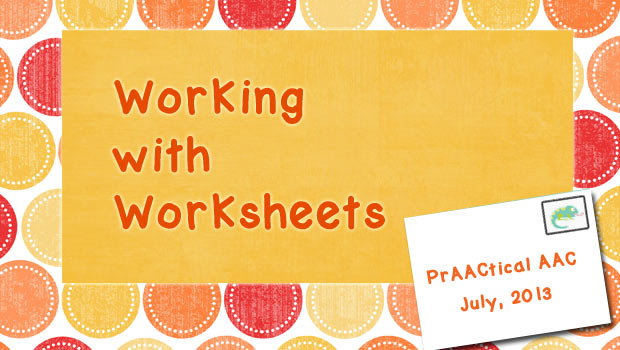
We’re not big fans of worksheets. In fact (true confession!), many years ago we actually hid a notebook full of them from a colleague who seemed to think they should play a prominent role in aphasia therapy. However, we concede that they are sometimes useful in limited quantities (‘sometimes’ being the operative word). More importantly, if teachers use them, we want our kids to be able to participate. Those who have difficulty with fine motor skills need alternate ways to manage worksheets so that they can be as independent as possible. Summer seems like a good time to learn a few new things that will come in handy once school resumes. If you’re looking for ways to make worksheets accessible on a shoestring, check out these resources. This presentation from Lynda Hartmann gives a good overview of accessible worksheets and provides information on a number of tools that you can use.... [Read More...]
July 5, 2013
by Robin Parker -
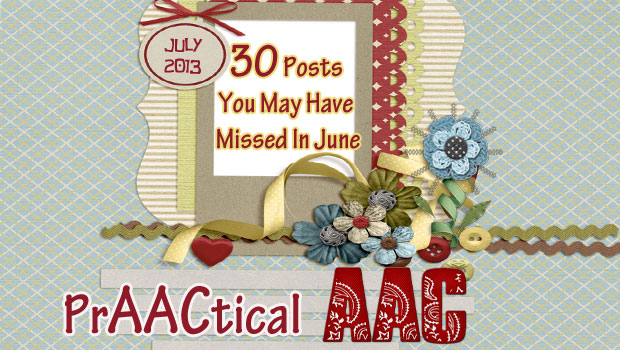
Strategy of the Month AAC Assessment for People with Aphasia Communication Books & Aphasia Speech Supplementation Strategies Aphasia, Supported Communication, Written Choice Strategy, + Variations Making it Work: 6 AAC Strategies for People with Aphasia PrAACtical Thinking Be Chatty: 5 Tips for Supported Conversation 5 PrAACtical Thoughts on Catch-Up Conversations 31 Posts You May Have Missed in May Where to Get PrAACtical Research Reviews Supporting the Use of AAC Listen to Me About What I Need and Want It’s PrAACtically Fathers Day PrAACtical Summer Learning 5 Questions about Aphasia & Communication Books Safety Matters: 5 Resources for People Who Use AAC Weighing The Evidence PrAACtical Evidence on Presuming Competence Helping People with Aphasia Compensate for Their Language Difficulties with Dr. Kristy Weissling PrAACtical Summer Activities AACtual Therapy/ How I Do It Go Fish with AAC and Shareka Bentham Marlene Cummings Shares and Implementation Toolbox Use your Best Spud to Teach Vocabulary... [Read More...]
June 15, 2013
by Carole Zangari -
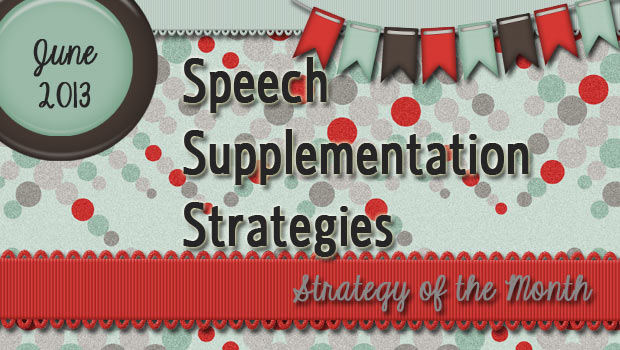
Anyone who has had a conversation with someone affected by aphasia is probably familiar with the ‘20 Questions’ approach to resolving communication breakdowns. Asking questions helps us take the piece of the message we understand (or think we do!) and build on that to gain more insight into the communicator’s intent. Take this exchange between a woman, Sandy, and her mother-in-law, Joan. Joan had a stroke a few years back and has both aphasia and dysarthria. Joan: “Gay” Sandy: “Gay? What do you mean, mom? Someone’s gay?” Joan: Shake head. “Gay” Sandy: “I’m not sure, mom. Gay?” Joan: “Gay” Points to the front door Sandy: “Kay? Are you telling me about Kay from across the street?” Joan: “Gay.” Nods Sandy: “What about Kay? Did she call?” Joan: Shakes head no Sandy: “Do I need to call her?” Joan: Shakes head no Sandy: “Did she stop by?” Joan: “Aaadihdih” Sandy: “Did... [Read More...]
June 3, 2013
by Robin Parker -
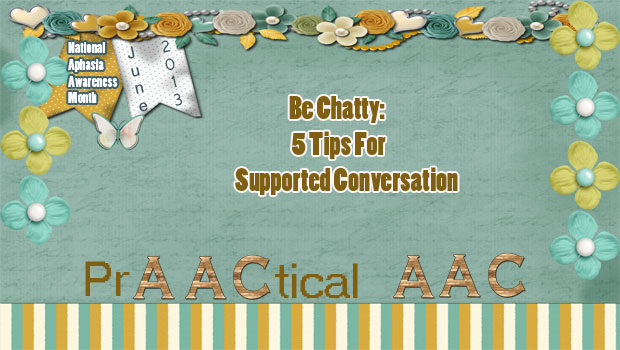
There are many strategies to support communication and conversation for individuals with significant aphasia. Conversation is about connecting with people. We engage in conversation about interesting and relevant experiences to help with connecting. To best connect and be part of conversation, there needs to be comprehension and expression from each communication partner. With aphasia, there is difficulty in these language areas, but it is not that language is lost, it is that it needs to be accessed differently. These quick start tips will support accessing conversation and connections. Write or Draw Key Words– When you are talking, write key words to support your spoken language. Gesture Key Words– When you are talking, supplement spoken language with gestures to illustrate a main point Show Related Photographs or Remnants– While you are talking, use photographs or some remnant of the an experience or event you are talking about. Written Choices to... [Read More...]
February 10, 2013
by Carole Zangari -
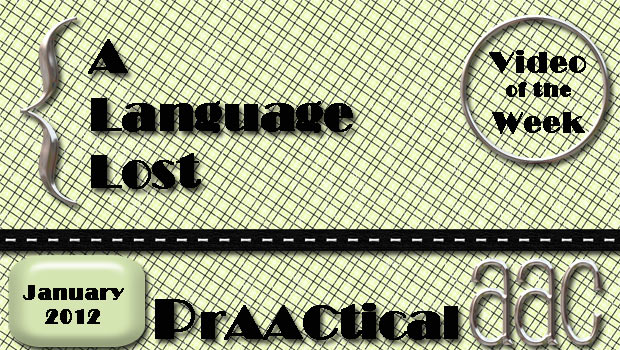
In this week’s video, Dr. Melanie Fried-Oken discusses how AAC can benefit individuals who are losing their language abilities due to Primary Progressive Aphasia (PPA). She reviews the disorder, provides great examples, and clearly explains AAC strategies that can be used to support these patients. We love the skillful way in which Dr. Fried-Oken balances current research with prAACtical guidelines for goals and therapy in this helpful video.
June 23, 2012
by Robin Parker -
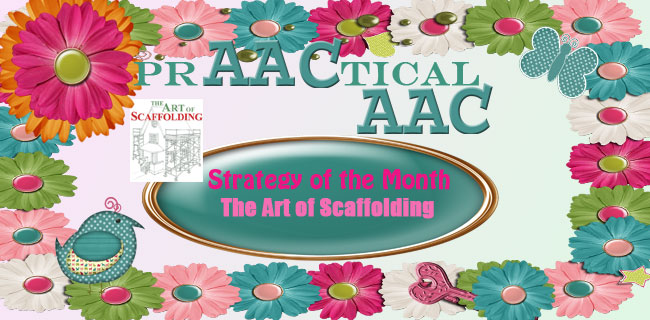
“The best thing about being a teacher is it matters. The hardest thing is that it matters every day. All the time.” Todd Whitaker (Just substitute SLP’s for teachers since SLP’s are teachers of communication and language) As June ends and we finish up with our Strategy of the Month: Language Facilitation Strategies, we do not want to move on without talking about scaffolding. We often use scaffolding without even knowing we are doing it, but for speech-language pathologists, we need to know the name of each strategy we use because that allows us to make the most of everything we say and do when teaching communication and language. Also, when we know what we are doing, we can teach it to communication partners and thus set the stage for language learning at home, in school, and in the community. What is it? Scaffolding is a verbal and visual strategy... [Read More...]
April 22, 2012
by Carole Zangari -
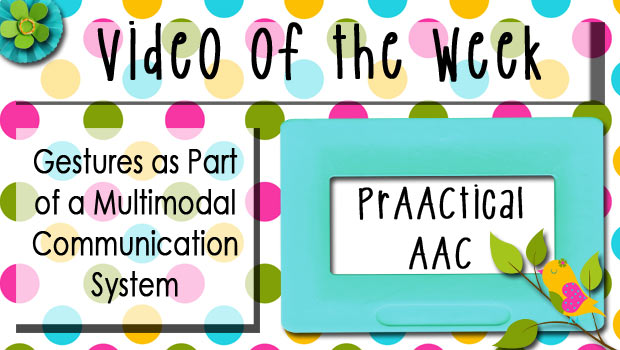
Gesture Recognition in Aphasia Therapy (GeST) is a project that emphasizes the use of gestures to help individuals with aphasia communicate effectively. GeST is a computer-based program to teach simple gestures and provide home practice opportunities. Project leaders used a participatory design to gain the input from 5 people with aphasia in developing the program. They are currently evaluating its effectiveness in a pilot study. We are big fans of multimodal communication and love the prAACtical applications of this program. You can check it out for yourself at this video.







